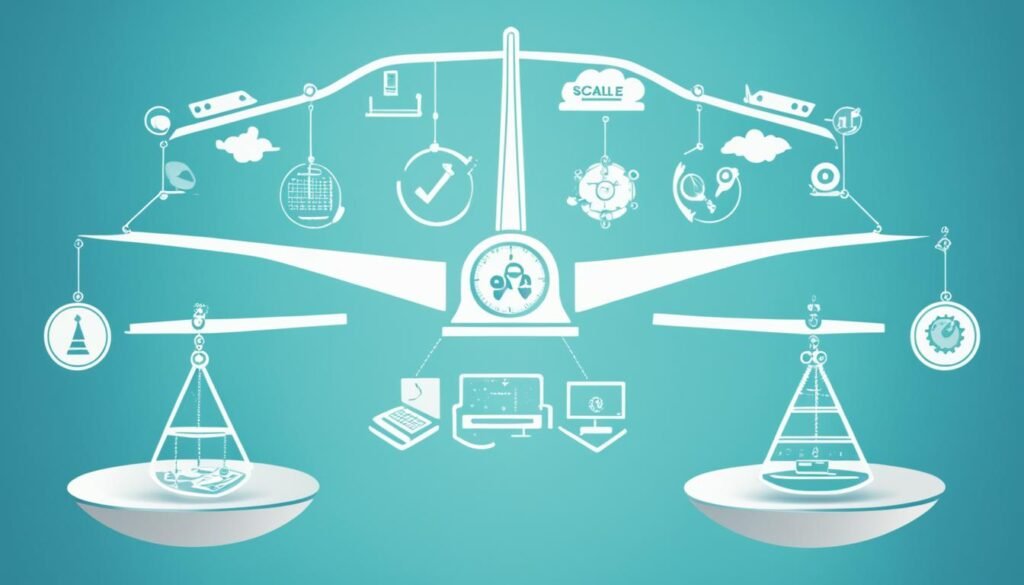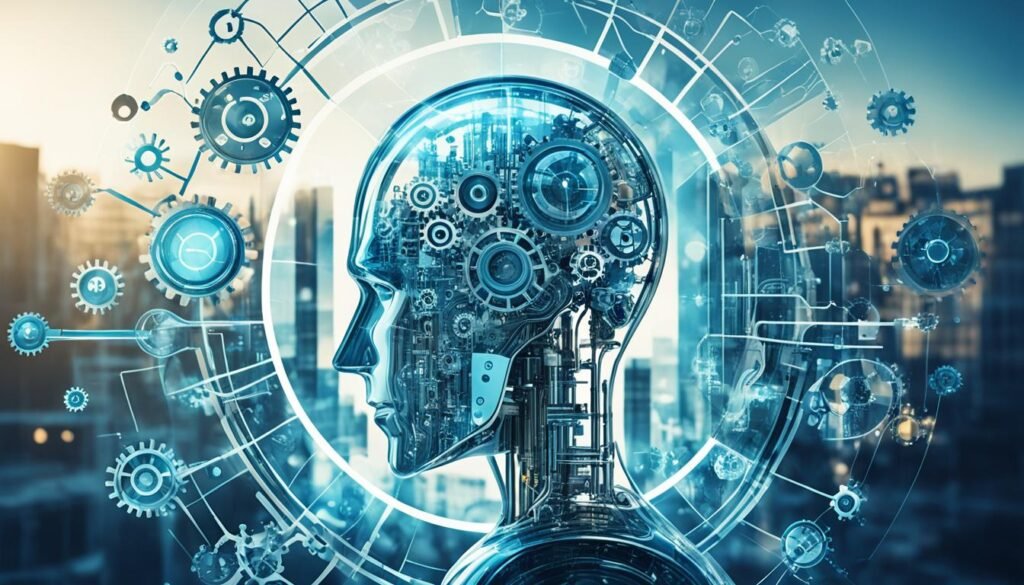AI is changing our world fast, bringing big changes to our jobs and society. It could automate up to 30% of tasks in many jobs. This makes AI a key part of building a future that mixes tech progress with caring for society.
As AI gets smarter, it’s changing old job roles. This makes us think about how machines and people will work together. We need to understand how AI affects jobs, like in healthcare and education, and how it keeps us safe online.
Key Takeaways
- AI’s big changes need us to focus on making it ethical and responsible.
- It’s important to make AI systems open and answerable to build trust.
- Fixing bias in AI decisions is a top priority.
- AI is changing how we work in many fields, making things more efficient.
- We must think about how AI affects jobs, privacy, and society as a whole.
AI’s Transformative Influence on Society
The digital age has brought us to a point where artificial intelligence (AI) is a key player. It has grown from the early days of the internet to the era of mobile devices, big data, and cloud computing. Each step has changed how we live and work.
Anchored in Ethics, Transparency, and Accountability
AI is now in many areas of life, making it clear we need ethical rules, clear information, and accountability. Responsible ai follows ethical ai principles to make sure it helps society. Using trustworthy ai methods, like fair algorithms and safe data handling, is key. This helps build trust and acceptance.
AI’s Potential to Automate Non-Routine Tasks
AI could automate many tasks in different jobs, says Berkeley Exec Ed. Up to 30% of tasks in about 60% of jobs could be automated. This doesn’t mean we’ll all lose our jobs. It means jobs will change, and we’ll need to be ready to adapt.
“AI is not a job killer but a job transformer, freeing up human workers to focus on higher-level activities.”
AI is changing our lives and work in big ways. By using responsible ai and its automation, we can make the most of this digital change. This opens up new chances for growth and innovation.
Establishing Safety Standards for Ethical AI
AI is changing how we work and live, so we must focus on making it ethical. It’s not just about automating tasks. AI now helps with complex data analysis and decision-making in many fields. We need to make sure AI systems respect our values and improve our lives.
Trust in AI comes from being open about how it works. This way, people can understand and use AI wisely. It also makes developers responsible for the risks and effects of their work. This balance helps us innovate safely.
We must follow ethical AI rules like fairness and respect. Testing AI can spot and fix biases and protect privacy. This way, AI can gain public trust and make society better.
| Ethical AI Principles | Key Considerations |
|---|---|
| Fairness | Ensuring AI systems do not discriminate or perpetuate biases against individuals or groups |
| Transparency | Providing clear explanations of how AI systems make decisions and operate |
| Accountability | Establishing clear lines of responsibility and liability for the actions of AI systems |
| Privacy | Protecting user data and respecting individual privacy rights |
| Inclusiveness | Ensuring AI systems are accessible and beneficial to diverse user groups |
By following ethical AI rules and safety standards, we can use AI’s power safely. This way, we can make progress without losing our values. It’s key to a future where tech and human values work together well.

Revolutionizing Industries With Ethical AI Integration
Responsible and ethical AI principles are changing industries worldwide. They bring new levels of automation, better decision-making, and more productivity. As AI grows, it’s clear it will change many sectors in big ways.
Best Practice: Ethical AI Development
It’s key to use ethical AI development to make sure AI helps society. This means focusing on transparency, being accountable, and following responsible AI rules from start to finish. By doing this, companies can use AI’s power safely and build trustworthy AI solutions.
The AI market in healthcare hit $15.4 billion in 2022, says Grand View Research, Inc. AI tools can look at complex medical images and find diseases early. In business, AI makes things run smoother, automates tasks, and helps make better decisions.
AI is getting better thanks to faster training times with GPUs and special AI chips. This makes AI research and use more open to everyone. Language models like GPT-3 and BERT are getting better at understanding language. This helps improve things like content creation, language translation, and virtual help.
As ethical AI changes industries, we need strong safety rules. This ensures AI is developed in a way that’s good for everyone. By following these rules, companies can use AI to innovate, work more efficiently, and make a positive difference in society.
Bridging Language Divides In Education Through AI
Using AI in education needs a careful plan to overcome language barriers and make learning resources available to all. As AI grows in schools, we must make sure it doesn’t widen the gap or create new ones.
Inclusive Education Through AI
AI in classrooms is raising a big issue – it often favors dominant languages. This limits inclusivity and keeps old inequalities going. Language has long been a tool of power, affecting people’s lives and the use of technology.
Maria Chmir, the leader of Rask AI, is working to fix language gaps in education. She knows online classes mainly focus on a few languages. Rask AI offers tools like content localization, translation, and dubbing. This helps make sure all students can understand their lessons, no matter their language.
For inclusive AI in education, it’s key to make learning materials in many languages. This way, all students can get the same chance to learn, preparing them for a global world.
| AI-Powered Education Features | Benefits |
|---|---|
| Personalized Learning | AI looks at each student’s learning style and needs to make lessons fit better, making them more engaging and effective. |
| Real-Time Assessment and Feedback | AI helps spot where students need help and lets teachers step in quickly, helping students move forward. |
| Language Translation Services | AI makes educational materials available in more languages, helping to bridge language gaps. |
| Data-Driven Curriculum Development | AI uses data to predict future learning needs and helps plan lessons better, making education more efficient. |
By using AI in education, we can make learning more inclusive and fair for everyone. AI tools that focus on language and culture are key to making sure inclusive education through AI is a reality.

AI Automation In Brand Development
AI automation is changing how we handle brand development. It brings new ways to make brand strategies better. It helps with understanding customers and making content just for them.
Informed AI Automation: A Best Practice
Using AI in brand development needs careful thought. Drake Tigges, a top digital marketing expert, talks about the need to keep up with social media and AI changes.
More businesses are using AI in marketing, up by 44% in two years. But, 68% of people worry about how companies use their personal info. Being open and ethical is key.
AI can make marketing messages more personal, which can lead to 5-10% more sales. These targeted messages also make people more likely to engage with brands. Yet, 62% of people don’t like the idea of AI making buying choices without them knowing.
To fix this, companies need to be ethical and protect data well. They should also work to stop AI bias. Being open and responsible helps brands use AI automation in brand development right. It keeps customers trusting and supports a good AI impact on society.
“Embracing the best practice of informed AI automation in brand development calls for a commitment to encouraging knowledgeable utilization, recognizing the inherent benefits, and maintaining vigilance amidst evolving platform dynamics for sustained success.”
ai ethics society
The future of AI is changing fast, shaping our society in big ways. We see a future where ethical practices, inclusivity, and knowledge matter a lot. It’s important for industries to use AI responsibly for good.
Through the work of innovators, we can make sure AI helps humanity and brings positive change. This is key to a better future.
Ethical AI principles are at the core of this change. They guide us in using AI in ways that respect our values and society’s well-being. By focusing on transparency, accountability, and understanding the AI impact on society, we can use AI to improve communities and drive progress.
We’re at a turning point with AI, and we all have a role to play in shaping its future. By working together, we can make AI empower people, improve decisions, and create a fairer, more inclusive world. The journey ahead will have its challenges, but ethical AI can help us overcome them. This way, we can build a future that benefits everyone.
“The future of AI is not just about the technology itself, but the ethical and societal implications it carries. By prioritizing responsible innovation, we can unlock the transformative potential of AI and build a future that benefits humanity as a whole.”

Ethical Considerations in AI Development
As AI becomes more common, we must focus on its ethical sides. Key concerns include algorithmic bias and privacy and surveillance. Making sure AI is fair and respects privacy is key to its responsible use.
Bias and Fairness
Algorithmic bias is a big problem in AI. Biases come from the data used and the people making the algorithms. This is seen in Generative AI, where AI might spread old stereotypes or lack diversity. Fixing this needs good prompt engineering and responsible developers.
But, trying to make AI unbiased can be tricky. Changing inputs to avoid old biases might lose important history. This shows the need to balance ethical standards with keeping history intact.
Privacy and Surveillance
AI needs a lot of data, which raises big privacy concerns. AI can look at a lot of personal info, making people worry about surveillance and data misuse. We need clear rules, transparency, and strict data use rules to keep AI safe and trusted.
As AI grows, we must tackle these ethical issues. Doing so will help make sure AI improves society, not harms it. Fair, transparent, and private AI development is key to unlocking AI’s benefits while reducing its risks.
Accountability and Transparency in AI
As AI grows in power, making sure it’s accountable and transparent is key. Figuring out who is responsible for AI mistakes is hard. But, being clear about how AI works and makes decisions builds trust. This makes fixing mistakes easier.
In Manila, a panel talked about how businesses should lead in using AI ethically. This shows that businesses have a big role in making sure AI is used right. They need to work with experts and leaders to make sure AI is developed and used correctly.
By focusing on ethics and being open about how AI learns, companies can use Generative AI safely. They must follow rules like GDPR and the OECD AI Principles. These rules help make sure AI is clear and fair.
Being open with AI has many good points. It builds trust, makes sure people are responsible, finds and fixes biases, and makes AI better. As AI gets more advanced, focusing on AI transparency and AI accountability is key. This way, AI can be a trusted and responsible partner in our lives.
“A survey on bias and fairness in machine learning indicated in the ACM Computational Survey that there is a need for greater transparency and accountability in AI systems to address these concerns.”

Workforce Implications and Job Displacement
AI is changing many industries fast. It brings new tech jobs but also threatens some old ones. Jobs that involve simple tasks might be at risk, like data entry or basic manufacturing.
We need to help workers adapt to these changes. By teaching them new skills for AI jobs, we can lessen the impact. Education and training are key to getting ready for the new economy.
Jobs like data scientists and machine learning engineers are becoming more common. This change means more efficiency and innovation. But, it also means some jobs might not be needed anymore.
AI raises big ethical questions too. We need rules to make sure it’s fair and safe. Governments should make laws that protect workers and encourage new ideas.
AI brings both good and bad news for jobs. By tackling these issues, we can make sure everyone benefits from AI. We can make the move to an AI-based economy smooth and fair for all.
| AI Impact on Society | Job Displacement |
|---|---|
|
|
“The future of work is not about human versus machine, but about human and machine.”
Conclusion
The journey towards ethical AI is ongoing. It needs vigilance, responsibility, and a commitment to continuous improvement. By understanding our history and its impact, we can make technologies that improve our lives without harming our ethical standards.
Embracing responsible AI lets us use this powerful technology for good. It helps us tackle challenges and make sure AI benefits humanity. This approach is key to a future where AI is a positive force.
We must think deeply about AI’s ethical sides, like bias, fairness, privacy, and transparency. Creating a culture of ethical AI principles lets us use AI to make our lives better. It also reduces risks and unwanted effects.
This effort needs teamwork from researchers, policymakers, and industry leaders. Together, we can make sure AI is made and used with the highest ethical standards.
As AI keeps getting better, staying alert and proactive is vital. By focusing on the ai ethics society and everyone’s well-being, we can use AI for a better world. The road ahead is challenging, but together, we can make AI a powerful tool for good.
FAQ
What is the role of ethics and accountability in the development of artificial intelligence (AI)?
Ethics and accountability are key in AI development. They make sure new tech matches our values and helps people. It’s important to have clear rules for safety and ethics. This helps avoid risks and makes AI good for society.
How is AI transforming industries and the workforce?
AI is changing jobs by automating simple tasks. This can make industries more efficient and innovative. But, it also means some jobs might disappear. So, we need to help workers learn new skills for the jobs AI won’t take.
How can AI be leveraged to bridge language divides in education?
To use AI to overcome language barriers in schools, we must focus on making education inclusive. We should make sure educational materials are in many languages. This way, everyone can learn equally and fix past inequalities caused by language.
What are the best practices for using AI automation in brand development?
The best way to use AI in brand building is to use it wisely. We should know its benefits and watch out for changes. This way, AI helps improve our brand strategies in a responsible way.
What are the key ethical considerations in AI development?
Important ethical issues in AI include fighting bias and ensuring privacy. We must also make sure there’s clear accountability and transparency. These steps are vital to make sure AI is good for people and follows our values.
